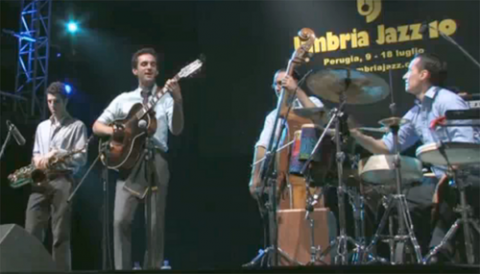Blumenthal on Lage

Julian Lage '08
Photo by Phil Farnsworth

The Lage Group performs at the Umbria Jazz Festival.
Photo courtesy of Ted Kurland
Among the highlights of Umbria Jazz 2010, one of the world's most prestigious jazz festivals, was the appearance of the Julian Lage Group. The 22-year-old guitarist and Berklee alumnus is no stranger to the spotlight, having made his first recordings with David Grisman before entering his teens, and he and his talented quintet handled the challenge of opening for the Chick Corea Freedom Band (Kenny Garrett, Christian McBride, Roy Haynes) in front of 4,000 listeners with the focused enthusiasm that has come to define the band's music.
The Lage Group had a rare opportunity to prepare for the European tour, which also made festival stops at North Sea and Gent, thanks to the generosity of Tony Falco.
"We play a lot, rehearsing as well as performing," Lage explains at the tour's completion, "but Tony offered us his place near Poughkeepsie for a week. I was nervous about the opportunity, because as close as we are I had no idea how we would function with so much freedom—but we did pretty well. My goal was to come up with 10 new songs, and when we left we had seven."
The Poughkeepsie retreat also allowed for a fuller integration of new member Dan Blake, who plays tenor sax and melodica and replaced Ben Roseth. Blake, who is also writing for the Group, has already lifted the saxophone from a supporting posture alongside Aristedes Rivas's cello to a greater level of interaction with the leader, bassist Jorge Roeder, and percussionist Tupac Mantilla.
Lage acknowledges that Blake has made for a more integrated musical experience. "Ben and I had played together before I played with the other members of the group," the guitarist notes, "and when he left I was at a crossroads. But the balance has shifted away from just me, Jorge, and Tupac during the tour, to the point where Aristedes, who is not an improviser like the rest of us, wanted a way into a deeper relationship with the music."
This is just one of the challenges that Lage has learned to confront as a bandleader. "There's a tendency to find music boring when you play several nights in a row," he admits. "But the music is new for each new audience, and I've learned to focus on a different element each time we perform, which we talk over before each performance. A big part of leading is being clear in what you want, and trusting that whatever you say is good enough.
"It's also hard, as a bandleader, to let go—to admit that sometimes laying out is best. That's not the paradigm that jazz comes from."
Like many of the best young musicians, the paradigm that Lage comes from is broad and ever-expanding. His set in Perugia reflected a love of African music, Django-like gypsy tinges, and traditional blues, as well as a bluegrass connection nurtured through occasional gigs with Mark O'Connor and numerous sessions. "I've spent as much time jamming with bluegrass musicians in Boston as with jazz guys," Lage reports, "and exposure to the folk tradition has taught me a lot about the freedom of just sitting down and playing."
With band members from Colombia, Peru, and Venezuela, the Lage Group might be considered naturally eclectic; and the music at Umbria, whether it's the virtuosic spin through Neal Hefti's "Li'l Darlin'" that had Mantilla drumming on the body of Roeder's bass or the set-closer that found the folksy "Butter and Eggs" yielding to the odd-meter vamp of "Motor Minder," is unbound by convention.
Listen to "Motor Minder," off Lage's first album, on the Sounds of Berklee podcast.
Lage, who admits he "can have insecurities when working at a jazz club," feels that audiences are ready for his approach. "We opened for the Punch Brothers in Brooklyn right before the tour began," he says. "It was not a jazz crowd, but boy did we connect. Ultimately, it's about being true to a vision and keeping a through-line in all of the music. In this band, I'm the through-line. If I see a connection between a Wayne Shorter tune and a Celtic jig, then it's there."
